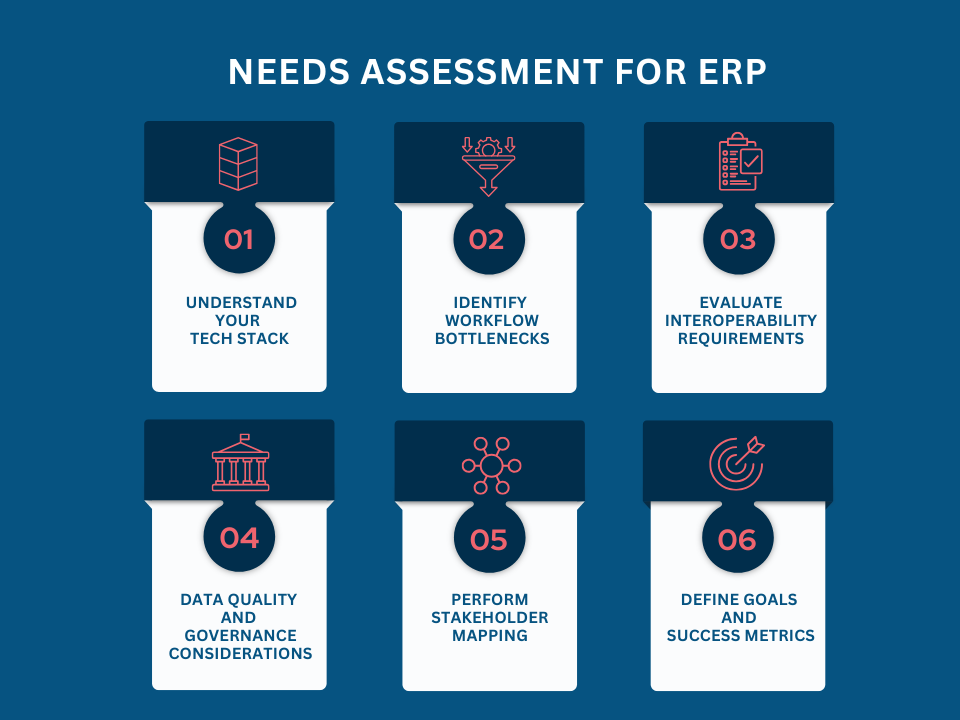This article walks through the key considerations hospitals should take into account, the types of ERP systems available, and how to choose a solution that supports long-term operational success.
The Need for Enterprise Resource Planning in Healthcare
Hospitals operate within some of the most complex environments in the world. Every day, clinical teams, administrative staff, supply chain managers, and financial departments handle thousands of moving parts that must work together with precision. As patient volumes grow and regulations evolve, this complexity becomes harder to manage with disconnected software or manual processes. This is why enterprise resource planning in healthcare is no longer optional.
ERP systems have become a strategic priority because hospitals need a unified way to manage data, resources, and workflows. Leaders require real-time visibility into operations, from staffing levels to inventory status to financial performance. Without centralized data, decision-making slows down and critical tasks fall through the cracks.
Integrated ERP systems connect departments, streamline communication, and reduce the risk of errors that arise when teams rely on separate tools. The right system minimizes delays, lowers administrative burden, and supports the consistent delivery of high-quality patient care.
Hospital Readiness and Needs Assessment for Enterprise Resource Planning
Before choosing or building an ERP system, hospitals need a clear understanding of their current environment and the challenges they want to solve. Enterprise resource planning healthcare solutions work best when they are grounded in real operational needs and supported by accurate data. A careful readiness assessment helps hospitals avoid costly missteps and ensures that technology decisions align with long-term strategic goals.
- Understanding your tech stack: Hospitals often use multiple systems for billing, scheduling, inventory, HR, and clinical documentation. Assessing these systems helps identify which tools can be integrated, which need to be replaced, and where significant gaps exist.
- Identifying workflow bottlenecks: Common bottlenecks include slow scheduling processes, billing delays, inventory shortages, and inefficient patient throughput. Mapping these challenges helps determine which ERP features will provide the most immediate improvements.
- Evaluating interoperability requirements: Since clinical data must flow seamlessly across departments, hospitals should work to understand how an ERP will interact with existing electronic health record systems. Strong interoperability helps reduce duplicate data entry and improves accuracy.
- Data quality and governance considerations: ERP systems rely on clean, consistent data. Before implementation, hospitals should assess data completeness, standardization, and security practices to avoid issues that could disrupt reporting or financial processes.
- Stakeholder mapping: Successful ERP projects require buy-in from clinical teams, operations, finance, and IT. Each group has different priorities and workflows, so early involvement ensures the system reflects real needs and gains broad support.
- Defining goals and success metrics: Hospitals must clearly outline what they want to achieve. Common goals include reducing costs, increasing visibility across departments, improving automation, and meeting compliance requirements. Clear objectives guide better ERP selection and implementation decisions.

What Hospitals Should Look for in Enterprise Resource Planning Software
When hospitals begin the enterprise resource planning software selection process, they need to evaluate systems based on how well they support both operational and clinical requirements. The right ERP should improve efficiency, strengthen data accuracy, and create a more connected environment across departments.
To make an informed choice, hospitals should focus on several key criteria.
1. Core Features
A strong ERP system should support financial management, HR, procurement, supply chain operations, asset tracking, and other essential administrative functions. These features form the foundation for better visibility and more efficient hospital management.
2. Healthcare Specific Requirements
Hospitals have unique compliance and security needs. The ERP must support HIPAA requirements, provide detailed audit logs, offer robust data security controls, and integrate smoothly with clinical systems such as EHR and EMR platforms.
These capabilities help protect patient data and maintain regulatory alignment.
3. Scalability and Modular Design
Hospitals change over time, so their ERP should grow with them. Modular systems allow organizations to add features and departments as needed without overspending or disrupting existing workflows.
4. Cloud vs On Premises vs Hybrid
Hospitals should consider whether they prefer cloud-based, on-premises, or hybrid environments. Each approach has different security, cost, and maintenance implications.
5. Importance of Custom Development
Off-the-shelf ERP solutions do not always fit complex or specialized hospital workflows. Custom development can fill gaps, enhance interoperability, and ensure the system aligns with unique operational needs.
6. Total Cost of Ownership and Vendor Considerations
Hospitals should look beyond upfront licensing costs and evaluate long-term expenses such as maintenance, upgrades, training, and integration. Strong vendor support and healthcare expertise are essential to long-term success.
Types of Enterprise Resource Planning: Understanding Your Options
Hospitals have a wide range of options when it comes to selecting an ERP system, and understanding the differences between these options is essential for making informed decisions.
Each type of ERP offers unique advantages and limitations, and the right choice depends on an organization’s size, goals, infrastructure, and operational challenges.
Below is an overview of the primary types of ERP systems used in healthcare settings.
On-Premises ERP
On-premises ERP systems are installed and maintained within the hospital’s own infrastructure. They offer a high level of control over data, security, and system customization. This can be beneficial for large hospitals with robust IT teams and strict data governance requirements.
However, on-premises systems often involve significant upfront costs for hardware, installation, and ongoing maintenance, which can make them less accessible to smaller facilities.
Cloud-Based ERP
Cloud-based ERP systems are hosted by the vendor and accessed through the Internet. They typically require lower upfront investment, allow for faster deployments, and reduce the burden on internal IT teams.
Cloud systems also receive regular updates that improve performance and security. However, even with these strong security features, some hospitals may have concerns about storing sensitive data off site.
For many organizations, the flexibility and cost effectiveness of cloud ERP makes it a compelling choice.
Hybrid ERP
Hybrid ERP systems combine on-premises infrastructure with cloud-based components. This approach allows hospitals to maintain control over critical data while still benefiting from the scalability and convenience of cloud solutions.
Hybrid ERP is often chosen by hospitals with existing legacy systems that they want to modernize without fully replacing.
Modular ERP
Modular ERP systems allow hospitals to implement the software in stages by choosing only the modules they need. This makes modular ERP highly flexible and cost effective.
Hospitals can start with essential functions such as finance or supply chain and add more modules over time. Modular systems are ideal for organizations that want to grow incrementally or have budget constraints that prevent a full deployment from the start.
Industry Specific ERP
Industry specific ERP solutions are designed for the unique needs of healthcare organizations. They come with prebuilt features that support clinical workflows, compliance requirements, and healthcare terminology.
These solutions reduce the need for heavy customization and can speed up implementation.
However, some industry specific ERPs may be less flexible when it comes to integrating with specialized systems or adapting to unique hospital processes.
Custom Built ERP Systems
Custom ERP development allows hospitals to create an entirely tailored system that aligns perfectly with their workflows, data structures, and operational goals. This is especially beneficial for hospitals with highly specialized departments or complex interoperability needs.
Custom systems require a larger investment and a skilled development partner, but they deliver unmatched flexibility and long-term value.
Enterprise Resource Planning for Hospitals: Typical Matches
Hospitals vary widely in size, complexity, and technological maturity, which means the best ERP option is different for each type of facility. Below is an overview of which ERP systems are typically the best fit for different hospital environments.
- Large hospital networks: Large hospital networks often have complex infrastructures, multiple facilities, and a wide range of clinical and administrative systems. Hybrid ERP or fully custom ERP solutions are usually the most effective options. These systems offer strong integration capabilities that allow the ERP to connect with numerous clinical platforms, including EHR and laboratory systems. They also provide centralized reporting features that give leadership a unified view of operations across all locations. Custom solutions are often preferred when workflows or data structures vary significantly from one department or facility to another.
- Mid-sized hospitals: These hospitals typically require a balance of robust features and reasonable cost. Cloud ERP or industry specific ERP systems meet these needs effectively. These solutions offer healthcare focused modules that support financial management, supply chain operations, and clinical integrations without requiring extensive customization. They also scale easily as the hospital grows and usually come with lower maintenance costs than on premise systems.
- Small hospitals or rural facilities: Smaller hospitals often work with limited budgets and IT resources, which makes cloud or modular ERP systems ideal. These solutions have lower upfront costs, faster deployment timelines, and reduced infrastructure requirements. Modular ERP also allows small facilities to start with essential functions and expand as needed, making it a practical choice for organizations looking to modernize gradually.
How Hospitals Can Choose the Right Enterprise Resource Planning System
Choosing the right ERP system requires a structured and thoughtful approach that considers both operational needs and long term outcomes. Hospitals can use the following decision-making framework to guide the process and ensure they select a system that supports their strategic goals.
Step 1: Identify Functional and Clinical Priorities
Hospitals should first determine what the ERP must improve. Common priorities include reducing costs, improving workflows, increasing visibility across departments, and supporting clinical coordination.
Step 2: Map ERP Capabilities to Needs
Once priorities are clear, hospitals can match ERP features to their requirements. A feature matrix helps teams compare systems based on functionality, ease of use, integration options, and customization potential.
Step 3: Evaluate Vendors or Custom Development Partners
Vendor selection should focus on integration experience, healthcare compliance knowledge, and the ability to support both off-the-shelf and custom solutions. Hospitals need partners who understand clinical workflows and regulatory standards.
Step 4: Assess Implementation Complexity
Successful ERP adoption depends on careful planning. Hospitals must evaluate data migration needs, required system integrations, and the level of training and change management needed for staff.
Step 5: Calculate Long-Term ROI
The best ERP choice considers long-term value rather than upfront cost alone. Benefits include fewer administrative errors, better resource utilization, reduced manual work, and smoother patient flow throughout the organization.
Why Custom ERP Development Is Becoming the Future of Hospital Operations
Custom ERP development is becoming the future of hospital operations because many healthcare organizations are discovering that off-the-shelf systems cannot keep pace with their growing complexity.
Hospitals rely on highly unique workflows, specialized clinical departments, and detailed administrative processes that require precision and flexibility. Standard ERP platforms are built for general business needs, which means they often fall short when hospitals need advanced automation, tailored functionality, or the ability to integrate deeply with existing clinical systems.
Custom development bridges these gaps by creating solutions that reflect the true nature of hospital operations and adapt to the demands of modern care delivery.
A custom ERP system can be designed to support the full spectrum of hospital activities. For example:
- Supply chain and inventory modules can automate stock tracking and reduce waste.
- Human resources and scheduling tools can handle staffing patterns, credential tracking, and shift management with greater accuracy.
- Financial management modules can streamline billing, budgeting, and reporting.
- Patient admissions and bed management tools can support real time decision-making and improve patient flow.
- Custom asset tracking systems that monitor equipment and devices throughout the facility.
- Compliance and reporting modules that simplify regulatory documentation and audit preparation.
Each of these modules are built to match the exact workflow of the department it serves, which improves efficiency and reduces training time for staff.
AppIt supports hospitals by creating secure, scalable ERP solutions that integrate seamlessly with existing clinical and administrative systems. Our approach includes detailed workflow analysis, strong data protection practices, and the ability to build modular components that grow with the organization. By focusing on both usability and interoperability, we at AppIt help hospitals create systems that strengthen operations and support better outcomes.
To explore how a custom ERP solution can support your hospital’s needs, contact us AppIt for a consultation.







